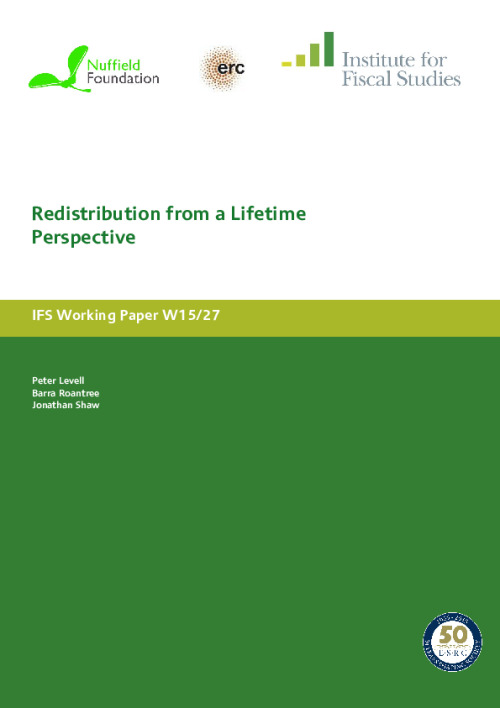Downloads

WP201527.pdf
PDF | 659.78 KB
Most analysis of the effects of the tax and benefit system is based on snapshot information about a single cross-section of people. Such an approach gives only a partial picture because it cannot account for the fact that circumstances change over life. This paper investigates how our impression of redistribution undertaken by the tax and benefit system changes when viewed from a lifetime perspective. To do so, we simulate lifecycle data designed to be representative of the experiences of the baby-boom cohort, born 1945–54. We examine the properties of the current tax and benefit system as well as historical and hypothetical reforms from both a lifetime and a snapshot perspective. We find that much of what the tax and benefit system achieves is effectively to redistribute across periods of life and, as a result, it is much less effective at reducing lifetime inequality than inequality at a snapshot.
Authors

Research Fellow Financial Conduct Authority
Jonathan is a Research Fellow at the IFS and a Technical Specialist in the Economics Department at the Financial Conduct Authority.

Associate Director
Peter joined in 2009. He has published several papers on the microeconomics of household spending and labour supply decisions over the life-cycle.

Research Fellow Trinity College Dublin
Barra is a Research Fellow at IFS and Assistant Professor of Economics at Trinity College Dublin.
Working Paper details
- DOI
- 10.1920/wp.ifs.2015.1527
- Publisher
- Institute for Fiscal Studies
Suggested citation
P, Levell and B, Roantree and J, Shaw. (2015). Redistribution from a lifetime perspective. London: Institute for Fiscal Studies. Available at: https://ifs.org.uk/publications/redistribution-lifetime-perspective (accessed: 27 April 2024).
More from IFS
Understand this issue

Public investment: what you need to know
25 April 2024

The £600 billion problem awaiting the next government
25 April 2024

A mess has been made of Child Benefit, and the clear-up operation may not be easy
29 March 2024
Policy analysis

4.2 million working-age people now claiming health-related benefits, could rise by 30% by the end of the decade
19 April 2024

Recent trends in and the outlook for health-related benefits
19 April 2024

Oil and gas make Scotland’s underlying public finances particularly volatile and uncertain
27 March 2024
Academic research

Intertemporal income shifting and the taxation of business owner-managers
24 January 2024

Insurance, redistribution, and the inequality of lifetime income
2 November 2023

The menopause "penalty"
18 March 2024